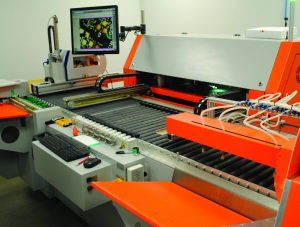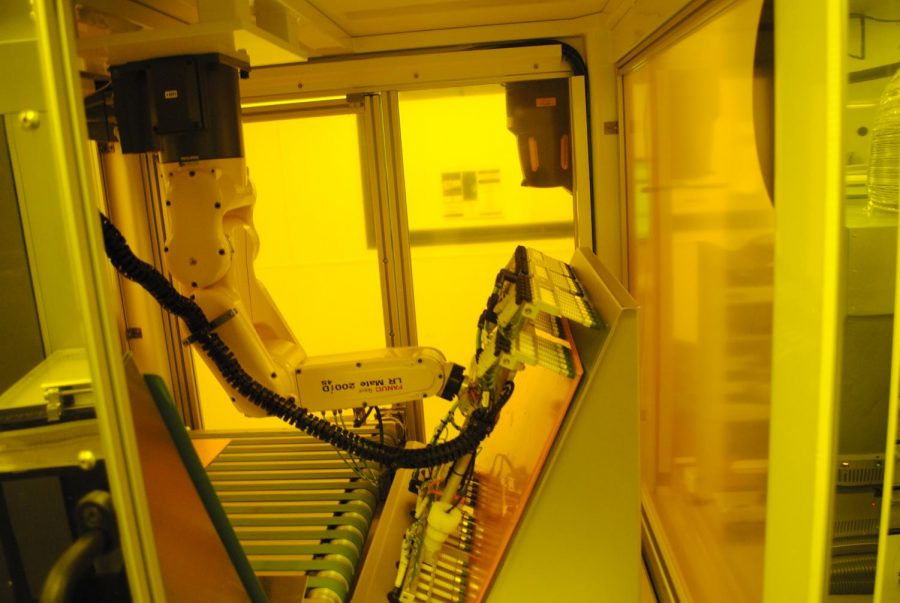Automation shifts labor needs in the Fox Valley
Oshkosh has 1,500 unfilled tech jobs
February 19, 2020
The high-wage, low-skill factory jobs that have shaped Northeast Wisconsin are being replaced by high-skill, high-wage jobs, but it isn’t clear that either workers or employers are ready for the shift.
Local companies currently have 1,500 tech jobs that they cannot fill, according to the Oshkosh Chamber of Commerce’s 2019 Economic Report. A new wave of automation, known as Industry 4.0, is emerging, but 88% of local manufacturers either have no plan or only a partial plan for implementing this technology.
Some of today’s high demand jobs include process engineers, data management analysts, cybersecurity officers, industrial computer programmers, data engineers, data architects and application developers. These jobs and the lack of employer preparation were shown in a 2019 survey of 104 manufacturers conducted by the Northeast Wisconsin Manufacturing Alliance (NMA), an organization that promotes the industrial sector in Northeast Wisconsin.
The need for a new type of worker is likely to increase as more businesses begin to adopt Industry 4.0, which combines production and operations methods with smart technology, creating an autonomous and interconnected digital business, according to NMA.
“Even Oshkosh Corp. says, ‘We’re a tech company that builds trucks,’” said Rob Kleman, the Chamber of Commerce’s vice president of economic development.
Ann Franz, director of the NMA, said the organization is working to increase awareness about Industry 4.0 because she expects it to take three years for supply chains to begin implementing it.
“By helping [businesses] be proactive now, we’ll be able to, hopefully, make them successful three years from now,” she said.

The manufacturing industry is shifting from a low-skill, high-wage industry into a high-skill, high-wage industry.
NMA’s survey found that automation-robotics and cybersecurity were the two areas that companies plan to invest the most heavily in over the next two to three years, with 62% planning to invest in automation and 56% planning to invest in cybersecurity.
Locally, the state Department of Workforce Development’s 2019 Workforce Profile for Winnebago County says 61% of the job tasks in the Fox Valley have the potential to be automated.
The Fox Valley has a higher share of workers in jobs that are more exposed to automation, specifically in production, installation and construction and extraction, while having a lower share of workers in the arts, sciences, computers and mathematics, according to the report.
Several companies have already embraced automation and other Industry 4.0 technologies. One in particular is Multicircuits, a circuit board manufacturer in Oshkosh that employs about 70 people.
Michael Thiel, the company’s director of operations and engineering, said it produces high-end circuit boards and has invested heavily in technology to meet demand.
Last year, Multicircuits purchased three automated drilling systems to increase efficiency. Prior to the upgrade, Thiel said the company’s drilling system required an operator to load panels onto a spindle to be drilled, and once the panels were drilled, the operator would unload them.
But with the new drilling system, the operator puts a barcode on each panel and puts them into a slot on the back of the drill, and the machine handles all the loading and unloading, he said.
The new drilling system “allows one operator to run multiple machines at once,” Thiel said.
The company also uses industrial robots with computer-controlled laser beams to define the circuit pattern directly onto circuit board panels, he noted.
“The operator can just load up the queue and tell the machine what jobs are loaded on there and the machine will handle the rest,” Thiel said. “It can sit there and run for a couple of hours by itself.”
In terms of cybersecurity, Multicircuits doesn’t use cloud services and data is stored in-house, he said. To protect the data stored in-house, the company uses products from Cisco Systems, a California-based networking hardware company.
Thiel said the software gives Multicircuits a next-generation firewall that scans for malware, makes sure workers aren’t going to unsecure websites and scans all ingoing and outgoing communications for viruses and malware.

Another company that’s embraced Industry 4.0 technology is Proto-1 Manufacturing, a machine builder for the tube and pipe industry operated in Winneconne that employs about 85 people.
Marc Jankowski, director of marketing at Proto-1, said the company offers tube and pipe manufacturers in the water and automotive industries “automated solutions.”
He said customers come to them for a project need, and his company tries to build either fully automated or semi-automated machines in response.
“We’re integrating the automation on our customer’s machines,” Jankowski said. “There’s been times where multiple robots are on our pieces of equipment, and there is no human interaction at all.”
Jankowski expects the manufacturing sector to continue to implement more automation because many of Proto-1’s customers are struggling to find skilled labor.
“Whether it’s fully automated, semi-automated or help with a repeatable process, that’s kind of where we’re seeing the industry going,” he said.
Fox Valley Metrology, an Oshkosh company that employs about 175 people and calibrates manufacturers’ measuring equipment, has also embraced new technology. Steve Toll, the company’s vice president of sales, said the entire company runs on a piece of software that was developed in-house called “Supreme Metrology.”
The software monitors an item every step of the way through the facility, from receiving to shipping, down to the employee working on a specific item, he said.
When an item is received, a QR code is stamped on it and it’s scanned into the computer system. The computer determines whether the item needs repair or recalibration. From there the item is tracked as its QR code is scanned as it goes through the facility until it’s shipped back to the customer.
Every step of the way, Fox Valley Metrology’s customers can check in on where the item is, whether it’s awaiting repair, waiting to ship or in transit.
Toll said the software allows for faster turnaround times from receiving items to shipping them back to manufacturers, which allows them to keep prices low.
“Most other calibration labs of our size would probably have close to 50%, if not 100%, more employees than what we’ve got because they’re going to have that many more people involved in the process to make sure things are going smoothly,” Toll said.
As more companies continue to embrace Industry 4.0, Franz said there is the potential for workers to be displaced.
“I wouldn’t worry about losing jobs, because there’s no people for all the jobs [and] that’s one of the reasons companies are having to look at automation and robotics,” Franz said.
The DWD report said increased automation exposure is expected to contribute to inequality both in terms of wages and education.
It added that automation will increase the need for workers to develop skills and will put an “additional emphasis on the roles of postsecondary education.”
The use of automation is likely to increase, as leaders from multiple industries in Northeast Wisconsin have realized that the region needs to evolve, or it will “become irrelevant over time,” according to a 2019 report by the New North, a regional nonprofit marketing and economic development organization.

Ideally, by 2030 the region will be connected by computers communicating between different facilities in the supply chain through the cloud, New North Executive Director Barb LaMue said.
“We have companies in the region that are already there,” she said. “And then we have others in the region that are just digesting the information, but don’t know where to go or what to do for the next step.”
As more companies begin taking that next step, the need to continue acquiring skills will only become more apparent, DWD Economist Ryan Long said.
Workers are going to have to be flexible and comfortable with the idea of continuously changing skills to meet the needs of the labor market, he added.
“Given that the nature of skills is expected to evolve at an accelerated rate, workers should be comfortable with the idea that finishing your formal training, through school or otherwise, is not the end of acquiring relevant skills,” Long said. “Being willing to continuously adapt and learn new skills might be one of the most useful traits a job seeker can possess.”
To address the need for a skilled workforce, the NEW IT Alliance, a nonprofit that aims to help companies fill tech jobs, has been working with local educators to help students develop computer skills.
Kimberly Iversen, the NEW IT Alliance executive director, said the nonprofit has helped Oshkosh North and Oshkosh West begin implementing the Microsoft TEALS (technology education and literary in schools) program to offer advanced computer science classes in high school.
“Progress is being made, but nowhere near fast enough to cover the skill gap that’s needed,” Iversen said.
The NEW IT Alliance isn’t the only nonprofit working to address the need for skilled talent. Franz said the NEW Manufacturing Alliance is working with K-12 educators to show students how STEM — Science, Technology, Engineering and Math — skills can be used in the real world.
At the college level, she said the NEW Manufacturing Alliance worked with UW Oshkosh and UW-Green Bay to introduce four-year manufacturing degrees at both universities.

“We’re able to give real data to our colleges of what are the jobs that we’re going to have now and in the future, and then how are those jobs going to need to change because of technology,” Franz said.
Beyond helping the next generation develop skills, she added that the NMA also helps manufacturers develop retraining programs to “upskill” their existing workforce.
UWO economics professor Chad Cotti said acquiring transferable skills will be crucial as Industry 4.0 continues being embraced.
To quell the fears surrounding automation, Cotti said it’s in the government’s best interest to invest in affordable education because education is good for economic development, “whether that be in formal higher education, technical school or just other skill-based programs.”














